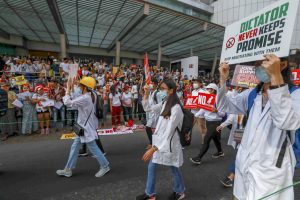The coronavirus is rapidly spreading in crisis-hit Myanmar, with the country recording another record number of daily COVID-19 cases, suggesting that the political situation here is on the verge of being compounded by a grave public health emergency.
The regime’s health ministry reported records of 2,318 cases on Sunday and 2,969 cases on Monday, bringing the total number of infections since the start of the pandemic to 168,374, with 3,461 deaths.
Given the country’s unstable political situation, which has prompted sharp disruptions to COVID-19 testing and containment efforts, it is almost certain that these are underestimates. Yesterday, Radio Free Asia (RFA) reported that hundreds of people have died of COVID-19 over the past 30 days in a single township in northwestern Myanmar.
Citing aid workers and local residents, RFA’s Myanmar Service stated that Kalay township in Sagaing Region, a population center of around 400,000 people that has been the scene of fierce fighting between the military and civilian militias opposed to the coup government, had seen upwards of 500 deaths over the past month. It also reported that the cost of oxygen was rising amid a spike in demand, a worrying sign that has also been seen during outbreaks in India.
Both the statistical and anecdotal evidence hint at the public health tragedy that is unfolding in Myanmar. Just before the military’s takeover on February 1, the civilian government led by the National League for Democracy (NLD) had managed to bring a surge of COVID-19 cases under control. But the coup upended the country’s hard-won COVID-19 gains. As tens of thousands of people walked off their jobs in opposition to the military, and security forces fired on crowds of protesters, health care services came to a near standstill and vaccinations stalled.
As if to dramatize the impact, the junta last month detained Dr. Htar Htar Lin, the former head of the country’s COVID-19 vaccine rollout, and charged her with high treason after she became a prominent leader in the anti-coup movement.
Even before then, many experts worried about Myanmar’s ability to handle COVID-19, given the poor state of the country’s health system, especially in remote rural parts of the country. In a 2000 study of the public health systems of 190 nations, the World Health Organization ranked Myanmar dead last. While the NLD government had made some progress in introducing public health reforms, the coup has brought most of these incipient efforts to a halt, as the junta’s efforts are bent on the imperative of maintaining control.
As has been witnessed in other nations, the trajectory of infections now appears to be approaching the vertical. Until June 19, Myanmar was reporting fewer than 500 new COVID 19 cases per day. Ten days later, the country passed 1,000 cases per day. It then breached 2,000 daily cases on July 1, before nearing 3,000 early this week.
The outbreak has prompted the junta to place 20 townships in six states and regions under pandemic-related stay-at-home orders. Outbreaks have been reported in the capital Naypyidaw, Yangon, the country’s largest city, and Mandalay, its second-largest urban center. Last week, all seven townships in Mandalay were placed under stay-at-home orders, and The New York Times reported that the city’s six hospitals that accept COVID-19 patients were filled to capacity.
According to The Irrawaddy, COVID-19 outbreaks have also brought Myanmar’s busy border trade with China to a halt, as Chinese authorities move swiftly to forestall any cross-border infections.
Given the context, the surprising thing is not that Myanmar is undergoing a spike in COVID-19 cases, but that it has avoided it for so long. With health workers and much of the Myanmar public in a state of open revolt and defiance against the military junta, it is unclear whether the new wave will be contained. It suggests more struggles lie ahead for a country already immersed in crisis.

































